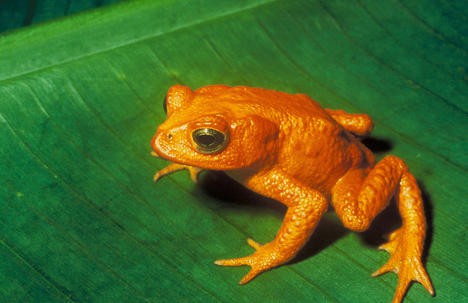The effects of global warming may seem distant – like biblical previews to an apocalypse not expected for many generations to come. According to some scientists, however, rising temperatures have already left irreparable marks on the world, and they are not far from home. A recent article in the U.S.-based National Wildlife magazine lists Costa Rica’s golden toad, a native species that disappeared from its mountaintop habitat of Monteverde in 1989, as the “first species extinction attributed to global warming.”
Biologist Allan Pounds, from the Tropical Science Center of the private Monteverde Cloud Forest Preserve, said scientists believe the extinction of at least two species of amphibians in Costa Rica can be attributed to climate change. “We believe the golden toad (Bufo periglenes) and the harlequin frog (Atelopus sp.), two species endemic to Monteverde, were wiped out by global warming in the late 1980s,” he told The Tico Times. Another 18 species of highland frogs have not been sighted for nearly two decades, though scientists have not labeled them extinct yet, he said.
Luis Diego Marín, the director of the private nonprofit Association for the Preservation of Wild Flora and Fauna (APREFLOFAS), said amphibians are the most susceptible species to global warming. “Amphibians are particularly affected by climate changes because of their sensitive skin and their incubation process,” Marín said. According to Pounds, amphibians are a better indicator species of climate change than other species, such as lizards, whose protective scales make them less sensitive to climate changes.
In the past century, reported world average temperatures have risen by 0.6 degrees Celsius (1 degree Fahrenheit), according to Pounds. Scientists are predicting even warmer temperatures in the coming years. In Costa Rica, average temperatures are expected to increase by 1.2 degrees Celsius (2 degrees Fahrenheit) by the year 2030, and 3.4 degrees Celsius (6.1 degrees Fahrenheit) by 2100, according to a study by the San José-based Regional Hydric Resources Committee (CRRH).
“This increase is based on an intermediate scenario, where measures to reduce consumption of fossil fuels and alternative energy options are implemented but do not operate at an optimal level,” said committee meteorologist Patricia Ramírez. “It is alarming – some natural systems are not able to adapt to change that exceeds 1 degree Celsius (1.8 degrees Fahrenheit) in periods of less than 50 years,” Ramírez added.
A joint study by the National Meteorological Institute and the committee is showing a consistent pattern of increasingly warmer nights in Costa Rica and Central America in the last 30 years – although results won’t be released for another three months. Increased global warming results from a change in the retention of energy in atmospheric gases – a condition attributed to human activity, according to meteorologist Roberto Villalobos, from the meteorological institute.
“As gases like carbon dioxide and nitrogen oxide accumulate and retain more heat, they generate climatic changes,” he said. In 1987, approximately 50 of the 174 species of amphibians in Costa Rica underwent a severe population crash that may have been caused in part by global warming. Frog fauna in Monteverde was reduced by almost 40% and 20 species went missing, Pounds said.
“The 1986-87 ‘El Niño’ effect, combined with a long-term global warming trend, brought on particularly warm conditions that year,” he said. “Climate change makes (amphibian) populations more vulnerable to disease, particularly to chytrid fungus, a type of fungus that grows on their skin,” said Pounds, a U.S. citizen who has become a naturalized Costa Rican.
In 2003, the harlequin frog surprised experts with what some have called a “reappearance” at the Rainmaker Conservation Project near the central Pacific town of Parrita. According to the daily Al Día, the harlequin frog was believed extinct until two U.S. researchers identified it at Rainmaker. However, according to frog expert Pounds, fairly recent DNA evidence suggests the “Rainmaker” harlequin (Atelopus varius) is a lowland species that does not belong to the same species as the extinct Monteverde harlequin (Atelopus sp.), whose scientific name means “in progress.”
Climate change also appears to affect many other species. “Changes in birds, reptiles and plants correlate to climatic changes. Species in foothills are moving up mountain slopes seeking lower temperatures,” Pounds said. The biologist cited the example of the keel- or rainbow-billed toucan (Ramphastos sulfuratus), not native to the cloud forest, that moved there apparently seeking the cooler temperatures.
While some animals are able to adapt to new conditions, many cannot. Pounds said a study of more than 1,000 species from around the world predicts one-fourth could disappear because of global warming by the year 2050.






